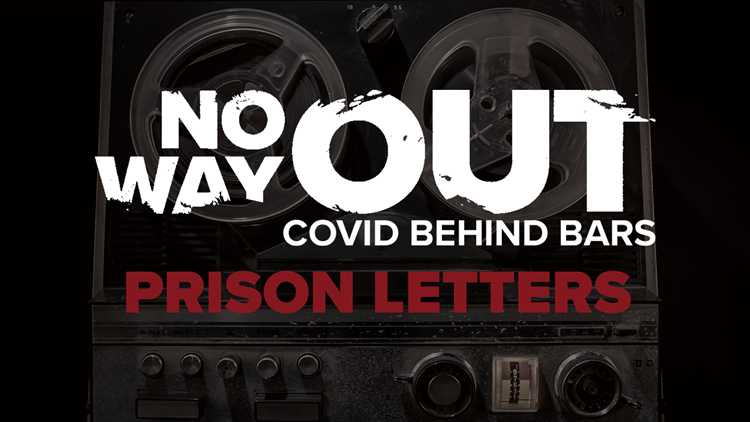More than 33,000 staff and prisoners have caught COVID-19 in the Texas prison system.
A WFAA investigation with The Marshall Project exposes how the coronavirus spread due to a lackluster response by the Texas Department of Criminal Justice.
For this project, reporters reviewed dozens of policy documents, internal reports, and leaked emails, along with hundreds of letters from prisoners and a handful of images and recordings captured on contraband cell phones. Interviews with more than 110 staff, prisoners and their family members.
At some units prisoners said that instead of getting medical treatment they were put in solitary confinement and given over-the-counter medication. Others said that staff ignored requests for help, including those from men who later died.
Even though the prison system locked down dozens of facilities to control outbreaks, officials undermined containment efforts by transferring prisoners while they were sick and forcing staff to fill in at infected units hours away.
At the request of reporters, Texas prisoners wrote letters detailing the conditions behind bars during the coronavirus pandemic.
The letters have been lightly edited for clarity and are read by people who were previously incarcerated.
Tandy
Tandy's story is read by Jennifer Toon.
Toon is a formerly incarcerated advocate currently working at the Coalition of Texans with Disabilities as a Mental Health Peer Policy Fellow. She aspires to help create policies that lead to better mental health support for kids, and which eliminate punitive practices that punish students for behaviors that are manifestations of disability or trauma. As a freelance writer, she has published work with The Guardian, The Marshall Project and The Tyler Loop.
David
David's story is read by David Collingsworth.
Collingsworth is a formerly incarcerated Houstonian now known for his work behind the scenes as the producer of The Prison Show on KPFT. During the 15 years he spent in Texas prisons, Collingsworth earned a GED as well as a bachelor’s in pastoral counseling. After he got out, he married his high school sweetheart. He now has a career with Planet Fitness as a facility manager for 26 gyms, and he is a local wedding officiant.
Javier
Javier's story is read by Jose Flores.
Flores spent almost 13 years in prison, including eight years in solitary confinement. He was released in January 2012 and now works for the state health department in addressing the opioid epidemic and assuring that those individuals with opioid use disorder receive treatment, prevention, and recovery support services. He’s also worked for the Texas Criminal Justice Coalition and is a Licensed Chemical Dependency Counselor and a graduate of the University of Texas A&M-San Antonio. He is currently working toward a graduate degree in mental health counseling.
Beatrice
Beatrice's story is read by Maggie Luna.
Luna is a peer policy fellow at the Texas Criminal Justice Coalition, where she uses her lived experience as a formerly incarcerated woman to advocate for change. During the 2019 legislative session — just a year after her release from prison — Maggie spoke up for women’s dignity bills and convinced lawmakers to support prison reforms that will help women. A graduate of the Smart Justice Speakers Bureau at Texas Southern University’s Thurgood Marshall School of Law, Maggie also helps to coordinate the Statewide Leadership Council, which TCJC launched to elevate the voices of system-impacted people in crafting local and state policy.
John
John's story is read by Doug Smith.
Smith spent nearly six years in Texas prisons and since his release has become a senior policy analyst with the Texas Criminal Justice Coalition and founding member of the Statewide Leadership Council. He also teaches social welfare policy at the University of Texas at Austin School of Social Work and trains advocates nationwide on effective legislative strategy. He serves on the board of the Austin Sobering Center. He graduated magna cum laude from St. Edward’s University and earned his master’s in social work from the University of Texas at Austin.
Brian
Brian's story is read by Anthony Graves
Graves spent 18 years behind bars after he was wrongfully convicted of murdering a family of six. Following his exoneration and release, he traveled the country telling his story, penned a memoir, founded a scholarship, accepted a spot on the Houston Forensic Science Center’s board of directors and founded the Anthony Graves Foundation. In 2020 he accepted a position as the community liaison at the Harris County Public Defender’s Office.
RELATED: See the full investigation here
WFAA has partnered with The Marshall Project, a nonprofit news organization that covers the U.S. criminal justice system, to produce No Way Out: COVID Behind Bars. Keri Blakinger is a staff writer with The Marshall Project based in Houston. Her work has focused on prisons and prosecutors.



